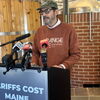
Processing Your Payment
Please do not leave this page until complete. This can take a few moments.
- News
-
Editions
-
- Lists
-
Viewpoints
-
Our Events
-
Event Info
- Women's Leadership Forum 2025
- On the Road with Mainebiz in Bethel
- Health Care Forum 2025
- On The Road with Mainebiz in Greenville
- On The Road with Mainebiz in Waterville
- Small Business Forum 2025
- Outstanding Women in Business Reception 2025
- On The Road with Mainebiz in Bath
- 60 Ideas in 60 Minutes Portland 2025
- 40 Under 40 Awards Reception 2025
- On The Road with Mainebiz in Lewiston / Auburn
- 60 Ideas in 60 Minutes Bangor 2025
Award Honorees
- 2025 Business Leaders of the Year
- 2024 Women to Watch Honorees
- 2024 Business Leaders of the Year
- 2023 NextUp: 40 Under 40 Honorees
- 2023 Women to Watch Honorees
- 2023 Business Leaders of the Year
- 2022 NextUp: 40 Under 40 Honorees
- 2022 Women to Watch Honorees
- 2022 Business Leaders of the Year
-
-
Calendar
-
Biz Marketplace
- News
- Editions
- Lists
- Viewpoints
-
Our Events
Event Info
- View all Events
- Women's Leadership Forum 2025
- On the Road with Mainebiz in Bethel
- Health Care Forum 2025
- On The Road with Mainebiz in Greenville
- On The Road with Mainebiz in Waterville
- + More
Award Honorees
- 2025 Business Leaders of the Year
- 2024 Women to Watch Honorees
- 2024 Business Leaders of the Year
- 2023 NextUp: 40 Under 40 Honorees
- 2023 Women to Watch Honorees
- 2023 Business Leaders of the Year
- + More
- 2022 NextUp: 40 Under 40 Honorees
- 2022 Women to Watch Honorees
- 2022 Business Leaders of the Year
- Nomination Forms
- Calendar
- Biz Marketplace
Maine small business owners say tariffs sparking confusion, disruption and chaos
 Photo / Renee Cordes
Tom Ruff, founder and CEO of Orange Bike Brewing, hosted a press conference on Monday about the impact of tariffs on small businesses in Maine.
Photo / Renee Cordes
Tom Ruff, founder and CEO of Orange Bike Brewing, hosted a press conference on Monday about the impact of tariffs on small businesses in Maine.
Signs that tariffs are damaging the business climate in Maine multiplied on Monday, with the owners of several small businesses offering firsthand accounts of rising prices, cancelled orders and other effects of President Donald Trump’s trade policies.
As of April 1, Orange Bike Brewing is paying half a cent more per can — or $30 more per pallet of 6,000 cans — from its Canadian supplier. Packaging is the biggest cost for the maker of gluten-free beer.
CEO Tom Ruff, who founded the business in 2023, said the increase on can prices is likely a response to the new 25% U.S. tariff on Canadian aluminum products, including empty cans, which took effect April 2.
“It may seem like a small amount, but factor that in and multiply it over and over again at scale,” Ruff said at a press conference he hosted at his brewery in Portland joined by counterparts from businesses in sectors from manufacturing to food retail. "It’s significant, especially to a small brewery like us.”
Ruff, standing in front of stacked orange cans from the latest shipment, later told Mainebiz that the tariff on aluminum imports could potentially add another $150 to his price per pallet, for a total price increase of $180 per pallet.
Housing concerns
Monday's event was held as part of a nationwide grassroots campaign called Tariffs Cost US that aims to provide the public with reliable, comprehensive information about global trade and tariffs and their impact on businesses and consumers.
Quincy Hentzel, president and CEO of the Portland Regional Chamber of Commerce, said that while businesses in general want predictability, what they're getting instead is confusion, disruption and chaos.
"The tariffs are being rolled out rapidly and without much warning, and it just feels like they're being decided without any inputs from the people who are actually getting impacted," she said.
She also voiced concerns about price increases in lumber, steel and aluminum making it more expensive to build housing, with negative consequences for employers trying to recruit workers.
"Every employer I know across the state is looking for talented, skilled workers," she said. "We're trying to attract them from all over the state and all over the country, and if we don't have affordable housing, we are not going to be able to attract these individuals here to Maine."
Other war stories
In South Portland at Brant & Cochran LLC, the niche maker of artisanal axes is paying higher prices for domestic steel and recently lost its biggest and longest-standing Canadian customer, which cancelled all of its orders for 2025.
The customer blamed reciprocal tariffs for making Brant & Cochran axes more expensive, and the fact that the “cavalier attitude” towards Canada means his customers don't want to buy U.S. products anymore.
“And I get it,” Mark Ferguson, the company's president and co-founder, said. “So my ex-customer will now buy axes from my Swedish competitor.”
Tariffs have also upended Brant & Cochran’s sales plans for 2025, when the company had planned to start exporting into northern Europe and Japan.
“We planned to go to an outdoor gear show in Germany this summer, which is expensive, and also into hiring Japanese distributors for our products,” Ferguson said. “With all the uncertainty around tariffs, we’ve put all those efforts on hold. Now we’ve got to reconfigure our entire sales plan for the year.”
Throwing water on the president’s argument about boosting U.S. manufacturing, Ferguson said, “I don’t have cash reserves like big companies to wait for these purported benefits of tariffs to take place. I have payroll for my six employees in two days. And I don’t think tariffs on steel imports are going to increase domestic production and lower prices by Wednesday.”
Tariffs are also having an impact on specialty food businesses like Sissle & Daughters Cheesemongers & Grocers, owned by married couple Mary Chapman and Will Sissle with five full-time employees.

The business, which started in a pop-up shop in 2018, sells cheeses and other delicacies from around the world.
As a result of tariffs, “we’re being forced to cut back on the variety of the products that we sell from small-scale producers, something that we’ve done since day one,” Chapman said at Monday’s press conference.
“Once these products go away because of tariffs, they very often don’t come back to the United States, because we’re putting small farmers, small cheesemakers out of business whether we know it or not,” she warned.
While Sissle & Daughters normally brings on two seasonal workers every summer, Chapman said that won't be the case this year “because we don’t know what things are going to be like this summer.”
Talk to us about tariffs
If you'd like to tell us how tariffs are affecting your business, please get in touch with Renee Cordes, Mainebiz deputy editor, at rcordes@mainebiz.biz.













0 Comments